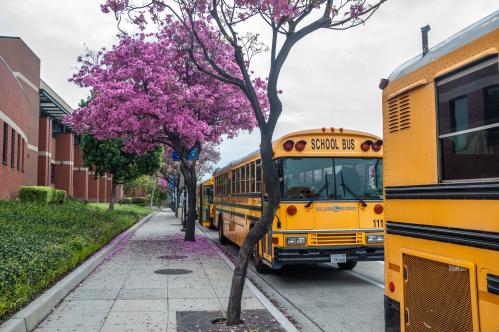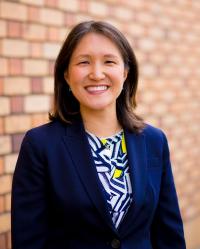For generations, public schools have struggled to equitably prepare all students—particularly those furthest from economic and social opportunity—to learn and thrive.
This is not because they don’t know how. The science of learning and development shows that all children—regardless of their race, ethnicity, zip code, or circumstance—thrive in “whole child” environments where their physical, cognitive, academic, socioemotional, and developmental needs are met. Furthermore, decades of school reform research point to the importance of trust, and relationship-centered, collaborative environments where families, educators, and communities work together to improve student outcomes. Yet even though the research provides compelling evidence of what is needed, the magnitude and scale of required change (e.g., systems, processes, and practices) is daunting.
Given this persistent challenge, there is increasing recognition of how a community school strategy might provide a blueprint for how schools and communities create learning environments in which children thrive. Research has found that well-implemented community schools “lead to improvement in student and school outcomes and contribute to meeting the educational needs of low-achieving students in high-poverty schools.” Several studies also find that community schools are a cost-effective strategy, yielding positive social and economic returns.
community schools forward
Community school practitioners and advocates have long struggled to consistently describe and advance this comprehensive approach to broadscale systemic reform and the expected outcomes. In 2022, the Community Schools Forward task force—convened by the Center for Universal Education at Brookings Institution, the Children’s Aid National Center for Community Schools, the Coalition for Community Schools at the Institute for Educational Leadership, and the Learning Policy Institute—worked to identify and create field-informed resources to align, build, and scale effective and sustainable community schools.
The consensus work of the task force is a major milestone and serves to leverage and amplify significant momentum across diverse federal, state, and local contexts. The resulting set of foundational resources below offers: a definition of community schools; an assessment of capacity-building resources needed to strengthen community schools; and preliminary implementation tools and resources needed to scale the community school strategy.
Align: Facilitate alignment and consensus building
We start by offering a definition that reflects the consensus expertise of community school leaders and practitioners who have engaged in this work for many years:
A community school strategy transforms a school into a place where educators, local community members, families, and students work together to strengthen conditions for student learning and healthy development. As partners, they organize in-and-out of school resources, supports, and opportunities so that young people thrive.
Community schools recognize that for students to thrive, schools must cultivate “whole child” environments that address physical, cognitive, academic, and social/emotional development.
We further elaborated on this definition in our newly created Essentials for Community School Transformation and Theory of Action for Community School Transformation, and articulation of Outcomes and Indicators for Community Schools: A Guide for Implementers and Evaluators. Taken together, this body of work reflects an aligned, research and practice-based approach to community schools design and implementation.
Build: Clarify and strengthen resources
Another integral part of the project was to clarify and strengthen resources to promote high-quality implementation and improvement of a community school strategy. The Stages of Development Tool provides an articulation of nuanced stages of development of community school initiatives and how they evolve over time from emerging to maturing to transforming. Strengthening community schools also requires experienced and field-informed technical support. The task force took stock of practitioners’ needs for support in the Community Schools Forward: Technical assistance needs assessment to better understand current community school capacity-building resources, and to provide forthcoming guidance to initiatives in how to choose high-quality technical assistance.
Scale: Guide and inform investment strategies
In order to inform investment strategies and supportive policies to expand and sustain community schools at scale, we have developed tools to guide leaders on understanding, budgeting, and financing community schools that can be adapted to reflect diverse fiscal contexts. For example, the Community Schools Costing Tool and User Guide helps education decisionmakers understand various programmatic and infrastructure costs, and examples of how they might combine existing funding streams as part of a collaborative approach to financial sustainability.
Building on essential resources
In the months and years ahead, it will be necessary to encourage field leaders to actively adopt the consensus framework and related tools; maintain implementation fidelity and rigor; and invest in scaling across organizational and policy contexts to ensure institutionalization of these essential resources.
The Community School Forward task force comprises of: Robert Balfanz, Jennifer Blatz, Cory Bowman, Jitu Brown, Dia Bryant, Pamela Cantor, Chris Caruso, Hedy Chang, Leslie Cornfeld, Linda Darling-Hammond, Dena Donaldson, Cyrus Driver, Debra Duardo, Amy Ellis, Abe Fernández, Denise Forte, Dreama Gentry, Jodi Grant, Jim Grim, Donnie Hale, Zaretta Hammond, Kristen Harper, Ashley Harris, Michael Hester, Tracy Hill, Reuben Jacobson, Sarah Jonas, Taylor Kahn-Perry, Kei Kawashima-Ginsberg, Greg Landsman, Carissa Moffat Miller, Jose Muñoz, Jeannie Oakes, Andre Perry, Sarah Peterson, Gema Quetzal, Jane Quinn, Todd Rogers, Rey Saldaña, Karen Sanchez-Griego, Katarina Sandoval, Kyle Serrette, Jim Shelton, Tony Smith, Tony Thurmond, Nathalie Umana, Helen Westmoreland, Rebecca Winthrop, and Brian Woods.
The Brookings Institution is committed to quality, independence, and impact.
We are supported by a diverse array of funders. In line with our values and policies, each Brookings publication represents the sole views of its author(s).







Commentary
Moving Community Schools Forward with foundational resources
January 12, 2023